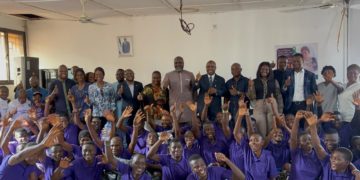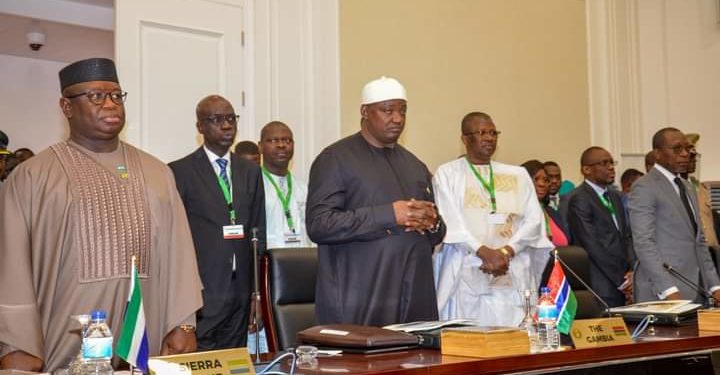Senegalese President Macky Sall’s announcement earlier this month not to contest for a third term brought to an end months of rumor about his suspected intention.
The move also reignited anti-third term campaigners’ resolve across the border in Gambia, where the focus has again turned to President Adama Barrow’s expressed intention to continue beyond his current term, against a promise he made not to do so.
President Sall’s announcement on Monday, July 3 laid to rest months of rumor that had led to heightened political tension and violence.
But it seems that the impact of his move goes far beyond Gambia.
He has been showered with praises from regional and international leaders, some of whom hope his peers can be inspired.
The US State Department said the Senegalese leader’s action “set an example for the region, in contrast to those who seek to erode respect for democratic principles, including term limits.”
And Liberian lawmaker and chairman of the ECOWAS Parliamentary Committee on Political Affairs, Peace, Security and the African Peer Review Mechanism, Edwin Snowe Jnr, also praised Sall’s move and encouraged President Barrow to borrow a leaf.
“For the sustainability of democracy in the Gambia, we need to promote democracy in its true meaning not by ambushing the constitution,” said Snowe Jnr, who is a senior Liberian Senator.
Even Barrow himself issued a statement praising Sall for his “courageous move” which he says will “Strengthen democracy in Senegal, the sub-region and Africa at large.”
Yet the two men have a similar story.
Barrow, first elected in 2016, came to power on the back of over two decades of struggle which brought to end one of Africa’s most brutal dictatorships under now exiled former President Yahya Jammeh.
It took a coalition of opposition political parties to bring Jammeh down. But his refusal to go peacefully brought the country to a near war.
The coalition had agreed that Barrow would serve only one term and organize elections under a free and fair atmosphere.
But just months into his first term, the alliance began showing signs of split. Eventually Barrow parted ways with all leading coalition members and formed his own party, under whose ticket he contested for his second term in 2021.
Among several reforms promised by the 2016 Coalition was a new constitution and Presidential term-limit.
Gambia remains one of over 20 countries in Africa where there is not presidential term-limit, and because of this, the country has had only two presidents since independence in 1965.
A draft constitution was done, but the Barrow administration declined to accept it, citing numerous technicalities in the document.
But his opponents believe that a big reason for this was the clause on term limit.
The president’s supporters’ argument also appears to justify this. They say his first term would not count even if the proposed term limit is accepted.
In the midst of this debate, Barrow last month made his strongest indication yet that he will be on the ballot in 2026, when the country is expected to go to the polls next.
“They are going around telling people President Barrow wants to step down and that they will soon take over the government. They should know that President Barrow is not going anywhere. What I will unleash on them in 2026 will be more devastating than what I inflicted on them in 2021,” he was quoted saying at a meeting outside Banjul on June 10.
But Sall’s announcement rekindled the debate, as Gambians took to social media to urge their own leader to follow on the Senegalese leader’s footsteps.
The leader of Gambia’s main opposition United Democratic Party (UDP), Barrow’s former party, also joined in the fray in a letter hailing Sall’s move.
“We pray that other leaders in our sub region and African continent will follow your great example and not seek third terms. And to accept once and for all that term limits for the highest office in any democratic nation is not merely a matter of constitutional or legal restraints against self-perpetuation, it is in fact a democratic imperative of the modern age,” he wrote.
ECOWAS has come under pressure for not doing enough to reign in on serving heads of state who violate their constitutions to prolong their stay in power. This has been blamed for the resurgence of military coups in the last three years.
Presently, three of its member states – Mali, Guinea and Burkina Faso are under military regimes. There have been reported attempted coups in Guinea Bissau, whose leader, Umaro Sissoco Embalo, last week handed over the rotating chairmanship of the sub regional grouping to Nigeria’s President Bola Tinubu, as well as in Gambia.
A proposal by the bloc in 2015 to impose term limits in its member countries was abandoned after Gambia and Togo kicked against it.
ECOWAS continues to maintain a peacekeeping force in the Gambia since 2016.
And interestingly, the currently head of the ECOWAS Commission, Dr Omar Alieu Touray, is a Gambian diplomat. This situation is likely to put him in a funny situation.






















